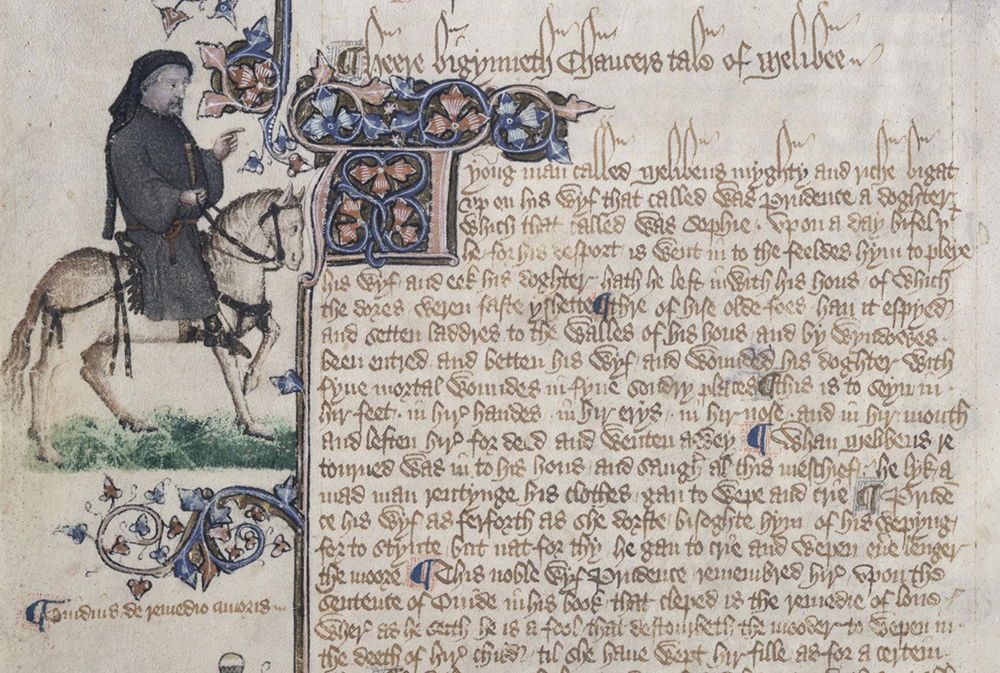Origins and Originality | History Today - 4 minutes read

In Chaucer’s great Trojan romance Troilus and Criseyde, there is a poignant moment when the hero, separated from his beloved by the misfortunes of war in a besieged city, tries to comfort himself by imagining how glad he will be when he can see her again. ‘Was there never fowl so fain of May’, he says, ‘as I shall be, when that she cometh in Troy.’
The idea of being ‘as glad as a bird of May’ is an attractive one. Chaucer didn’t invent it; it was a proverbial expression in medieval English, more usually found in the triply alliterative form ‘as fain as a fowl of a fair morning’. The suggestion is of the rapturous birdsong of a summer dawn, when birds sing (so poets like to think) as if for pure joy in welcoming the sun. ‘Fain’ implies happiness but also eager excitement, and that’s how Troilus pictures his feelings at being reunited with his lover – a sudden rush of gladness which overflows into song.
Chaucer uses this expression several times across his writings, in slightly different forms: characters are said to be ‘as glad as fowl of day’, or ‘as fain as fowl is of the bright sun’. His readers at the time would have recognised it as a familiar phrase, perhaps even a cliché. There were other proverbial expressions on a similar theme, so that a person might be ‘as blithe as a bird on bough’, or ‘as merry as a nightingale’.
Middle English literature had a rich stock of such proverbial phrases and idioms, and they can provide intriguing glimpses into medieval culture. When it comes to the conventional associations of animals, for instance, these may be recognisable to us today – bees were already proverbially ‘busy’, foxes ‘sly’, and so on – or they may be more puzzling: the common expression ‘as whole as a fish’ (i.e. in very good health) is a particular oddity.
In poetry, alliterative phrases like ‘as fain as a fowl’ are part of a literary style which in the 14th century was still heavily influenced by the traditions of oral poetry, with its characteristic formulae and common collocations. These phrases are frequently found in the most popular kinds of literature, intended for a broad audience, but even a self-consciously sophisticated writer like Chaucer – a very bookish poet, with a deep love of European and classical culture – was happy to draw on the common stock of this poetic inheritance when it suited his needs.
Modern critics and editors sometimes take a disdainful attitude to these conventional phrases, condemning them as predictable and banal. They don’t fit well with modern taste: we expect that in most contexts writers should strive to be original, avoiding cliché rather than relying on well-worn phrases. But the tastes of medieval readers were different: in a tradition-oriented culture which placed a high value on proverbial wisdom, originality was less important than the pleasure that could be found in familiar expressions.
For modern readers, these sayings may be much less familiar, so they can offer us a different kind of pleasure. What were clichés in the 14th century can be fresh and new to us, with the charm of unfamiliarity. In any case, even an apparently simple image like the ‘bird on a bright morning’ may not be as obvious as it seems. Several times in Middle English poetry it describes knights who are happy because they’re excited to fight a battle – a rather violent form of gladness, which might not exactly be what we connect with the joyful sound of birdsong. However, it does accord with another common association of birds in medieval culture (again, perhaps a surprising one to a modern audience) which links the chatter of birds’ voices with fractious squabbling and combative debate.
Chaucer’s use of the phrase is subtle, too. For him it seems to have suggested a particularly fragile kind of happiness – not a secure and lasting joy, but a brief and perhaps illusionary pleasure. Every time he uses it, the joy the characters are feeling will prove deceptive in some way. When Troilus imagines being as glad as a bird in summer at his reunion with Criseyde, the reader already knows that this reunion will not happen; she will never return to Troy, and the city and Troilus himself are doomed to destruction. If his hope is as beautiful as birdsong, it is also as ephemeral and fleeting – a joy one moment, gone the next.
Eleanor Parker is Lecturer in Medieval English Literature at Brasenose College, Oxford and the author of Conquered: The Last Children of Anglo-Saxon England (Bloomsbury, 2022).
Source: History Today Feed